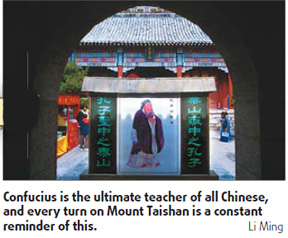I arrived at the south entrance to the Temple of Confucius in Qufu while it was drizzling. By the time I reached the Family Mansion to the east of the temple, it was a downpour. The small street outside the complex was so flooded I had to wade through it.
I was furiously searching my head for an epigram in the Analects about storms or bad weather. But nothing came up. My limited education in Confucianism was obtained in the 1970s when the ancient sage mysteriously turned into a target for Chairman Mao Zedong's wrath. Even then we were not taught the original text, only the Three-Character Classic, a limerick for kids.
I learned that Confucius was accused of "self-restraint and attempt to restore old rituals". I didn't know what that meant. At home, my grandma told me Confucius had invented the writing system of the Chinese language. Later on, I found to my chagrin it was not true. But I was not aware how many quotes from him are on our lips and how much of his wisdom is in our genes. Like it or not, Confucius is the ultimate teacher for all Chinese.

Confucius lived in a three-room house, but after he died he was made into a saint and the complex, through numerous rebuilding and expansion, now encompasses 460 rooms. Phalanxes of emperors and aristocrats made their pilgrimage to Qufu, and they left a legacy of their own. In one courtyard, so many pavilions housing steles were erected the eaves almost touch one another.
What is stored in this second largest historical building complex in China (after the Forbidden City)? It is mostly the reverence of latecomers and the lofty stature Confucius enjoyed until the 20th century. It is more about how he was perceived than who he was.
To sense the greatness of Confucius, you can simply glance in any direction in this city of 60,000, many of whom are his descendents. Everywhere are axioms enunciated by him and made popular by generations of schoolchildren who learned all his words by rote.
This one appeared on the wall of the hotel where I was staying: "Isn't it a joy to have friends from afar?" It is the very first sentence from the Analects and a fitting phrase for the tourism business.
I don't know what Qufu residents thought about their forefather in the 1970s, but they should be very grateful now. Everyone of us who's soaked in the shower of his wisdom should build a shrine in our heart.
(China Daily August 19, 2009)